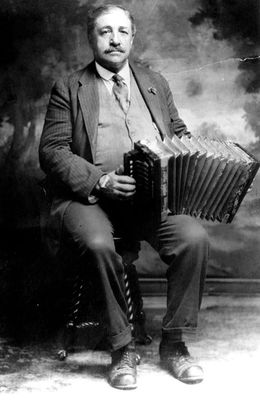Annotation:Marche du siffleur: Difference between revisions
No edit summary |
m (Text replacement - "garamond, serif" to "sans-serif") |
||
| Line 1: | Line 1: | ||
=='''Back to [[{{BASEPAGENAME}}]]'''== | =='''Back to [[{{BASEPAGENAME}}]]'''== | ||
---- | ---- | ||
<p><font face=" | <p><font face="sans-serif" size="4"> | ||
'''MARCHE DU SIFFLEUR''' (Whistler's March). AKA and see "[[Limoilou]]," "[[Reel de Limoilou]]," "[[Reel St-Antoine (2)]]," "[[Whistler (The)]]." Canadian, March (2/4 time); American, Polka. G Major (Miller & Perron): D Major. Standard tuning (fiddle). ABB'. The march was composed by Montreal accordinon player and composer Alfred Montmarquette (1871–1944), who recorded it in 1930 ("Accordéon & Castagnettes, avec siffleur"). Harmonica player Henri Lacroix recorded a version five years later (1935) as "[[Reel St-Antoine (2)]]," and Joseph Allard recorded it as "[[Reel de Limoilou]]." | '''MARCHE DU SIFFLEUR''' (Whistler's March). AKA and see "[[Limoilou]]," "[[Reel de Limoilou]]," "[[Reel St-Antoine (2)]]," "[[Whistler (The)]]." Canadian, March (2/4 time); American, Polka. G Major (Miller & Perron): D Major. Standard tuning (fiddle). ABB'. The march was composed by Montreal accordinon player and composer Alfred Montmarquette (1871–1944), who recorded it in 1930 ("Accordéon & Castagnettes, avec siffleur"). Harmonica player Henri Lacroix recorded a version five years later (1935) as "[[Reel St-Antoine (2)]]," and Joseph Allard recorded it as "[[Reel de Limoilou]]." | ||
<br> | <br> | ||
| Line 7: | Line 7: | ||
</font></p> | </font></p> | ||
[[File:montmarquette.jpg|260px|thumb|right|Alfred Montmarquette]] | [[File:montmarquette.jpg|260px|thumb|right|Alfred Montmarquette]] | ||
<p><font face=" | <p><font face="sans-serif" size="4"> | ||
''Source for notated version'': | ''Source for notated version'': | ||
<br> | <br> | ||
<br> | <br> | ||
</font></p> | </font></p> | ||
<p><font face=" | <p><font face="sans-serif" size="4"> | ||
''Printed sources'': | ''Printed sources'': | ||
Miller & Perron ('''101 Polkas'''), 1978; No. 59 (appears as "The Whistler"). | Miller & Perron ('''101 Polkas'''), 1978; No. 59 (appears as "The Whistler"). | ||
| Line 18: | Line 18: | ||
<br> | <br> | ||
</font></p> | </font></p> | ||
<p><font face=" | <p><font face="sans-serif" size="4"> | ||
''Recorded sources'': | ''Recorded sources'': | ||
<font color=teal> | <font color=teal> | ||
| Line 26: | Line 26: | ||
<br> | <br> | ||
</font></p> | </font></p> | ||
<p><font face=" | <p><font face="sans-serif" size="4"> | ||
See also listing at:<br> | See also listing at:<br> | ||
See standard notation transcription at Identitairs Québécois [http://www.mustrad.udenap.org/partitions/TQ347.jpg]<br> | See standard notation transcription at Identitairs Québécois [http://www.mustrad.udenap.org/partitions/TQ347.jpg]<br> | ||
Latest revision as of 14:19, 6 May 2019
Back to Marche du siffleur
MARCHE DU SIFFLEUR (Whistler's March). AKA and see "Limoilou," "Reel de Limoilou," "Reel St-Antoine (2)," "Whistler (The)." Canadian, March (2/4 time); American, Polka. G Major (Miller & Perron): D Major. Standard tuning (fiddle). ABB'. The march was composed by Montreal accordinon player and composer Alfred Montmarquette (1871–1944), who recorded it in 1930 ("Accordéon & Castagnettes, avec siffleur"). Harmonica player Henri Lacroix recorded a version five years later (1935) as "Reel St-Antoine (2)," and Joseph Allard recorded it as "Reel de Limoilou."

Source for notated version:
Printed sources:
Miller & Perron (101 Polkas), 1978; No. 59 (appears as "The Whistler").
Recorded sources:
Starr 15692-B (78 RPM), Alfred Montmarquette (with Édouard Bolduc, Médart Levert, and Adélard St-Jean) (1930).
See also listing at:
See standard notation transcription at Identitairs Québécois [1]
Hear Montmarquette's 1930 recording at the Public Domain Media Database [2]
